Settler violence against human rights activists is not the work of a few ‘rotten apples,’ but rather a government-backed strategy that could have dangerous consequences. We should be taking it deathly seriously.
By Libby Lenkinski
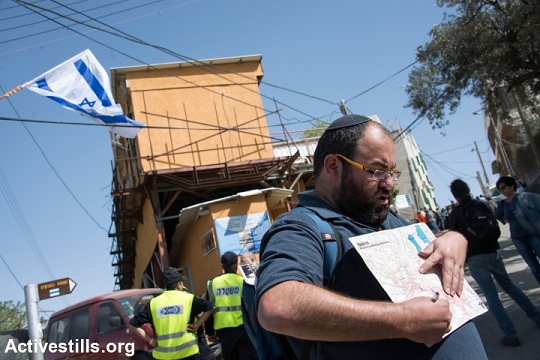
Over the last few weeks, the settlers in the West Bank city of Hebron have ramped up their harassment of Breaking the Silence activists who lead tours of the city for Israelis and internationals alike. Two weeks ago, settlers threw paint at tour leader Frima Bubis as she was guiding a group of Birthright walk-offs, and on Sunday a right-wing activist physically assaulted Breaking the Silence founder Yehuda Shaul during a tour.
It is convenient for some observers, and certainly for the Israeli government, to regard these acts and these individuals as aberrations, extremists – just a few rotten apples. I wish that were the story.
In fact, the reaction to these events has proven that they are not aberrations; that they are, in fact, enabled by the Israeli authorities. Though the individual who assaulted Yehuda was arrested, questioned, and released, Israel has consistently refused to take the ongoing problem of settler violence seriously and use the tools available to properly deal with it.
Imagine for a second what it would look like if the Israeli government did take settler violence seriously. We would likely be seeing law enforcement stepping in to arrest violent settlers caught on videotape taunting and assaulting Shaul, Bubis, and Breaking the Silence Executive Director Avner Gvaryahu. We would see increased state-provided security for Breaking the Silence tours to ensure their safety. We would see criminal due process, investigation, charges, and sentencing. Each and every member of Knesset who believes in the rule of law would speak up and make clear that this behavior is unacceptable. We’d see coverage of violent incidents on every major media channel and condemnation from settler and religious leaders.
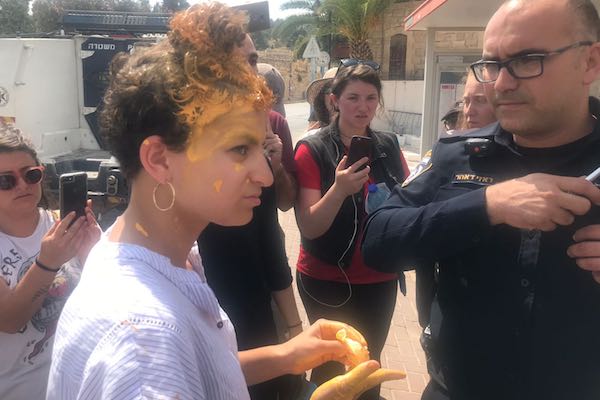
None of this is happening. Why? Because the assault on Yehuda was not the work of a rotten apple, it was the effect of a rotten system that needs to be fixed. Some will say it’s no big deal, that we have bigger fish to fry — but they are wrong. Here are three reasons why:
1. The real story is the occupation. Yehuda does not want attention following the assault. Here’s what he posted on Facebook after the attack:
Thanks everyone for your support and concern over the past few days. I am doing fine. Yesterday, settlers attacked two Palestinians in Hebron with pepper spray — let’s turn our attention to those who need it the most.
This isn’t uncommon for people who know the occupation and see who really suffers the brunt of settler violence: Palestinians. We must always remember that, as hard as the situation becomes for Israeli human rights defenders, we are not living under occupation and are part of the privileged class in many ways.
And still, that Shaul was physically assaulted in Hebron should not go unnoticed. This escalation of violence and hatred toward Israel’s human rights defenders must stop. Three years ago, I wrote that this kind of violence was a canary in the coal mine, which signals worsening politics and a reliance on fear and intimidation. I think we’ve seen those results to be true.
2. Incitement is part of the right wing’s big-picture strategy. The attack on Yehuda is the result of 10 years of Prime Minister Netanyahu’s strategy in play. In 2007, Netanyahu said Israel was in danger of losing the legitimacy to defend itself. Later that year, Netanyahu advisor Ron Dermer, now Israel’s Ambassador to the United States, said it would be the “enemies from within,” those Israelis “airing the dirty laundry” about Israel’s policies for the world to see, who would be to blame for “delegitimization.”
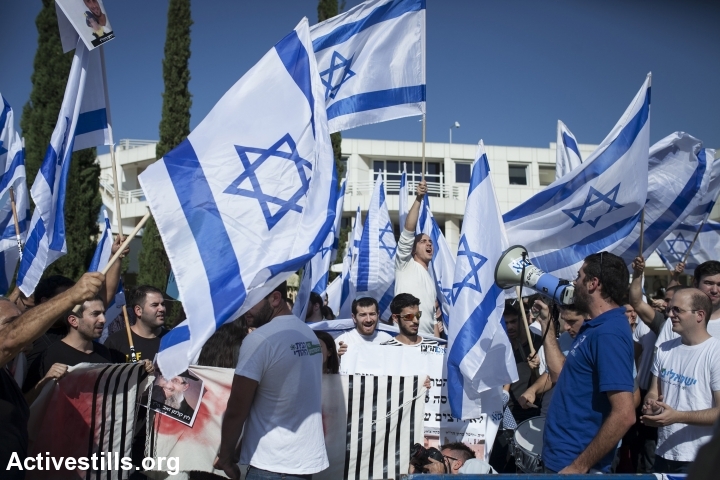
And who airs this dirty laundry? Palestinian citizens of Israel and human rights organizations. Thus, goes the thinking, we must go.
For much of the past decade, the Netanyahu government and its network of GNGOs (government-funded/backed NGOs) have been targeting these “enemies from within” through legislation, smear campaigns, and now violence.
Far-right group Im Tirtzu attacked former NIF President Naomi Chazan with hateful billboards. Years later they would turn their attention to Breaking the Silence. Just last month, among several dangerous bills, the Knesset passed a law that gives the minister of education the authority to ban Breaking the Silence from entering schools.
The rhetoric needed to pass this kind of legislation is nothing short of incitement, so are we surprised when settlers take a cue and attack a Breaking the Silence guide? We should not be. The blood drawn by a settler’s fists are not on his hands alone.
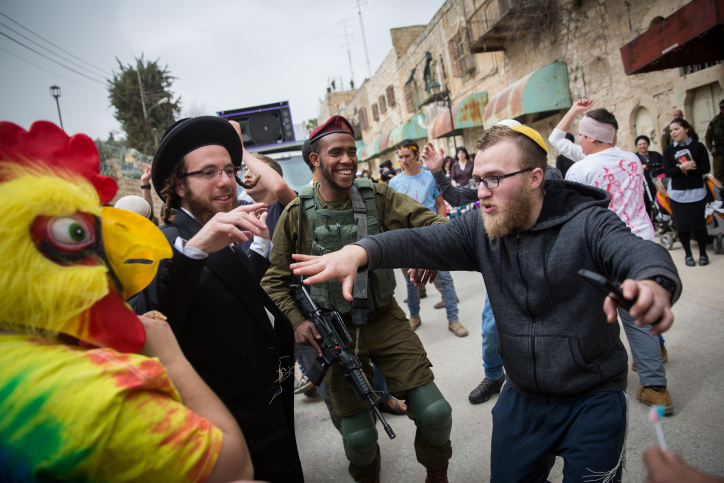
It is shared across the political map. While the right has spent a decade demonizing Breaking the Silence, the opposition has decided to play into its strategy instead of opposing the growing incitement and violence. Anyone who is not speaking up about these things is helping the far-right achieve its goals. It is that simple. It is complicity. And it is a big deal.
3. Our appetite for outrage is being slowly pushed and tested. While radical settlers take their cues from their government, the opposite is also true. The Israeli government and its GNGOs test out radical ideas to gauge the public’s appetite, which is then followed with legislation and policy that slowly push the public and the national narrative further and further to the right.
Last week, amid the storm of anti-democratic activity, Prime Minister Netanyahu once again took to Facebook to attack the New Israel Fund for pushing back against the Jewish Nation-State Law. His post was a relatively minor incident, but it was a test balloon: he is gauging the public’s readiness to push us out of society.
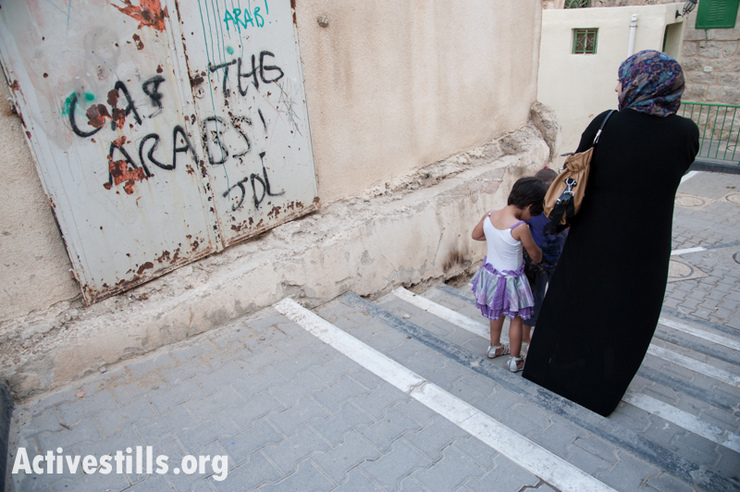
The escalating settler violence in Hebron is a strategy that has very real potential consequences, which we should be taking deathly seriously.
In 1983, Israeli educator and activist Emil Grunzweig was killed at a Peace Now rally by a radical right-winger named Yonah Avrushmi. After several years of incitement against peace activists by rabbis and other right-wing leaders, Avrushmi saw fit to take matters into his own hands and threw a grenade at Grunzweig during a rally in Jerusalem.
In 1995, the tone and tenor of the right’s incitement against Prime Minister Yitzhak Rabin and the left was at fever pitch with burning effigies and depictions of the prime minister in a casket, and radical right-winger Yigal Amir saw fit to take matters into his own hands. He assassinated Rabin as he stepped off stage at a peace demonstration in Tel Aviv, an act that subsequently launched a new political era and catapulted those behind the deadly incitement into the halls of power.
We have these precedents in our history. We know this can and will happen. How many more signs do we need to take the incitement and the test balloons seriously?
Libby is the Vice President for Public Engagement at the New Israel Fund. Libby is co-chair of the Board Hashomer Hatzair North America and is a NY co-chair for the Reboot Network.
